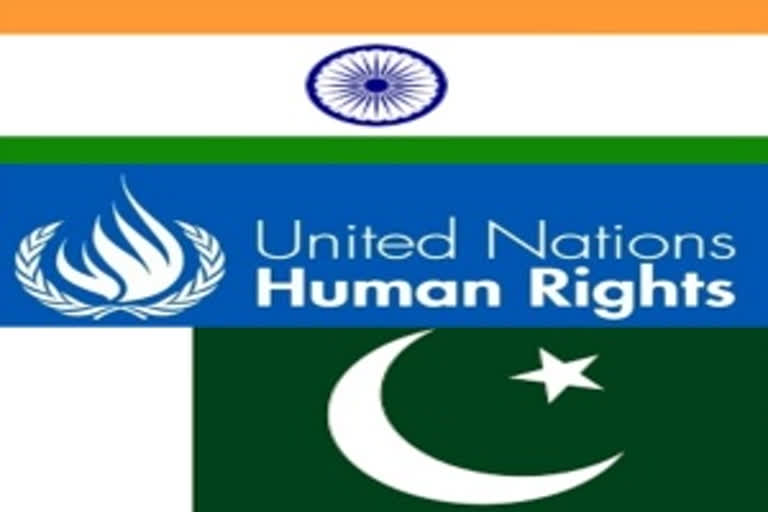New Delhi: India on Wednesday exercised its Right of Reply in response to the statement by a representative of Pakistan during the High-Level Segment of the 46th session of the Human Rights Council (HRC).
India's Right of Reply was delivered by the second secretary, Permanent Mission of India to UN, Seema Pujani at the 46th session of HRC.
She said, "We are not surprised that Pakistan’s representative has chosen to misuse this august forum yet again. Pakistan’s continued misuse of various platforms to engage in baseless and malicious propaganda against India is not new."
"We reiterate that the entire Union Territories of Jammu and Kashmir and Ladakh are an integral and inalienable part of India. The steps taken by the Government to ensure good governance and development in these Union Territories are our internal matters", she reiterated.
This comes after Pakistani Human Rights Minister Shireen Marzari raked up Pakistan's criticism of the human rights situation in Kashmir at the Human Rights Council on Tuesday.
To this, India in a strongly worded statement said, "As a country with one of the world’s worst human rights records, Pakistan would do well to put its own house in order, before venturing to point a finger at India".
Pujani underlined that the violence, institutionalized discrimination and persecution faced by Pakistan’s minorities, including Christians, Sikhs and Hindus, has continued unabated.
Also Read: Pakistan remains safe harbour of terrorists: India at UNHRC
"There have been frequent attacks on the places of worship of minority communities, a grave violation of their right to freedom of religion and belief", the young diplomat added," she said.
The condition of women belonging to minority communities, notably Hindus, Sikhs and Christians, remains deplorable.
An estimated 1,000 women from minority communities are subjected to abduction followed by forced conversion and forced marriage in Pakistan every year, according to a recent report published by the Human Rights Commission of Pakistan.
"Most of these women fall in the age bracket of 16-25 years. The fact that young women, and not men or older women, are the main victims of forced conversions is a telling fact about Pakistani society", she pointed out.
Shias, Hazaras and Ahmadiya communities have continued to face persecution, state-condoned violence and discrimination.
Adding that it’s well known that Pakistan has been crushing dissent and engaging in political repression in Balochistan, and other regions, for decades, Pujani said, "Enforced disappearances, arbitrary detentions and torture have been used as tools of coercion. Several Baloch human rights defenders have even met tragic death under mysterious circumstances, while in exile. Pashtuns and Sindhis have continued to struggle against systemic oppression and discrimination".
Referring fo the instances of repression of journalists and civil society activists are rife, Gulalai Ismail, a Pakistani human rights defender who campaigned against violence against women and enforced disappearances was charged with sedition, terrorism and defamation in May 2020, Pujani said, "In August 2020, Ms Ismail sought refuge in the USA. As retribution, the Pakistani authorities have now arrested her father, Muhammad Ismail, on ‘terror’ charges."
Also Read: India slams Pak after it misses deadline to file resolution on Kashmir in UNHRC
In September 2020, UN human rights experts condemned the enforced disappearance of Idris Khattak, a former consultant with Amnesty International and Human Rights watch.
Khattak had himself worked on reports on enforced disappearances in Pakistan’s Federally Administered Tribal Areas, before disappearing himself in November 2019, in a cruel twist of fate.
The UN human rights experts have called upon the Pakistani authorities to end Khattak’s secret detention at the earliest.
Pakistan has been the home and patron to the largest number of internationally proscribed terrorist entities and individuals in the world.
As many as 126 individuals and 24 entities, sanctioned under the UN Security Council 1267 and 1988 Committees’ Lists, are associated with Pakistan.
State-sponsored terrorism by Pakistan is a threat, not only to India but to other countries in the region and beyond.
The recent acquittal of Omar Saeed Sheikh, the al-Qaeda terrorist and murderer of the American journalist Daniel Pearl by the Pakistani Supreme Court is a clear example of the Pakistani establishment’s nexus with such entities and, as the US Secretary of State said, it is "an affront to terrorism victims everywhere.”
She further urged the Council to call upon Pakistan to take credible and irreversible steps to end state-sponsored terrorism and dismantle the terrorist infrastructure in the territories under its control.
As regards the remarks made by Turkey, she said, "We find them completely unacceptable. It is ironical for a country that has trampled upon its civil society to pass unjustified comments on other’s internal matters".
As far as the subject of UN Resolutions is concerned, India advised Turkey to practise what it preaches by first implementing those UN Resolutions that apply to it.
Further India rejects the factually incorrect and unwarranted references to India and expressed regret that the OIC countries continue to allow Pakistan to misuse OIC platforms to indulge in anti-India propaganda.
"The Government of India is fully cognizant of its human rights obligations and committed to the promotion and protection of the human rights of our people", Pujani said.
The statement of the External Affairs Minister has outlined India’s perspective on human rights, both about India and in the global context.
Also Read: India slams Pakistan at UNHRC for false, fabricated concerns for human rights



